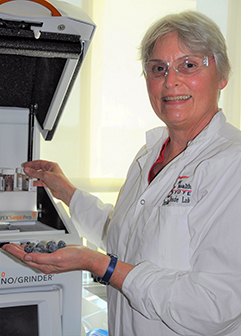Postharvest Physiologist Penelope Perkins-Veazie Presents 2021 ARS B.Y. Morrison Memorial Lecture
Contact: Kim Kaplan
Email: Kim Kaplan
Denver, CO, August 8, 2021—"Phytochemicals, Postharvest, and Human Health: The Next Chapter " is the title of the 2021 Agricultural Research Service Benjamin Y. Morrison Memorial Lecture, presented today by Penelope Perkins-Veazie at the annual meeting of the American Society for Horticultural Science.
"Up to half of the fruits and vegetables produced never get consumed, which has negative impacts on natural resources, economic returns and human health. We've come to realize that preserving produce quality has become increasingly critical to making fruits and vegetables a larger part of our diet, which helps sustain health and ultimately improves the quality of life," Perkins-Veazie said.
Perkins-Veazie is known worldwide for her groundbreaking research on how postharvest storage of fruit and vegetable alters their nutritional and phytonutrient profiles. Her work has included assessing how genetic traits, production systems, and postharvest storage management affect nutritional and market characteristics. She also has developed storage methods that have helped to extend the shelf life of produce.
Her findings have helped create new markets and production opportunities for a range of specialty crops including niche produce such as radicchio, turnip, okra, butternut squash, blackberry, raspberry and muscadine.
 ARS 2021 Benjamin Y. Morrison Memorial Lecturer Penelope Perkins-Veazie.
ARS 2021 Benjamin Y. Morrison Memorial Lecturer Penelope Perkins-Veazie.
The nutritional benefits of watermelon is an area for which Perkins-Veazie is particularly noted. She confirmed that watermelon contains as much lycopene as tomatoes; lycopene being a powerful antioxidant that promotes cardiovascular health and helps protect against certain cancers. She also demonstrated that the lycopene content of watermelon is affected by genetics, irrigation and postharvest preparation. These efforts helped transform the profile of watermelon from mainly a dessert food to a functional food with significant health benefits, which has greatly elevated its market appeal to producers and consumers alike.
Perkins-Veazie currently is a professor in the Department of Horticultural Science at North Carolina State University. Among her honors and awards are being elected a Fellow of the American Society for Horticultural Science (ASHS), receiving the ASHS Outstanding Researcher Award and the ASHS Outstanding Paper Award-Vegetable Publication, and serving as President of ASHS, Southern Region. She is editor for the American Pomology Society and serves on the Editorial Board for Postharvest and Biotechnology.
ARS established the B. Y. Morrison Memorial Lecture to honor the memory of Benjamin Y. Morrison (1891-1966) by recognizing scientists who have made outstanding contributions to horticulture. B.Y. Morrison was the first director of USDA's National Arboretum in Washington, D.C. A scientist, plant breeder, landscape architect, plant explorer, author, and lecturer, Morrison advanced the science of botany and horticulture in the United States. His legacy to the American public includes dozens of new ornamental plants, including the Glenn Dale azaleas. More information about the B.Y. Morrison Memorial Lecture can be found at https://www.ars.usda.gov/research/lectures/index/
The Agricultural Research Service is the U.S. Department of Agriculture's chief scientific in-house research agency. Daily, ARS focuses on solutions to agricultural problems affecting America. Each dollar invested in agricultural research results in $17 of economic impact.
